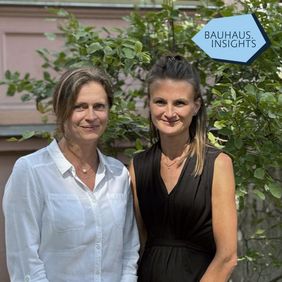BAUHAUS.INSIGHTS: Together we are visible – the Sekretariate@Bauhaus network
The tasks traditionally handled by the administrative departments at universities has changed considerably in recent decades: these classic administrative offices have since evolved into hubs for academic management. Often, the staff are the first point of contact for academics, students, decentralised administrative departments and external guests. They not only coordinate events, but also distribute information, handle financial matters and communicate – across departments, proactively and often »seemingly effortlessly«.
To lend greater visibility to their work, which takes place in the background but is nonetheless crucial to ensuring that everything runs smoothly at the university, the administrative teams at the Bauhaus-Universität Weimar joined forces in October 2024 to form the »Sekretariate@Bauhaus« network. The aim: to make the central role they play in university operations more visible, encourage a professional exchange and actively help shape processes.
For our BAUHAUS.INSIGHTS series, we spoke with Susan Schür and Susanne Riese, who are both administrative staff within the Faculty of Architecture and Urbanism and spokespersons and initiators of the network. We asked them what prompted the collaboration – and their plans for the network in the future.
Ms. Riese, together with Ms. Schür, you founded Sekretariate@Bauhaus, a network for administrative staff by administrative staff, on 28 October 2024. Today, it already has 45 active members. When did it become clear to you that greater collaboration is needed?
Susanne Riese: In 2022, our central equal opportunity officer here at the university made me aware of the »FairNetzt Euch!« campaign that the Federal Conference of Women’s and Equal Opportunities Officers at Universities (bukof) had launched. I subsequently had the opportunity to attend the second national network meeting of university administrators in Kassel.
It was most enlightening! And it was also new to me that well-structured networks had existed and successfully been working at countless other universities for a long time. The clear benefits of these networks – the exchange and mutual support between administrative offices – immediately became clear to me.
It says on your webpage on the university website what you wish to achieve: an exchange, training, visibility – and the opportunity to help shape processes before decisions have been reached. Is it really that straightforward? How would you like to develop the network’s impact realistically and in the long term?
Susan Schür: For us, these are precisely the four overarching topics closest to our hearts at the moment. They may of course evolve and change in the future. A network thrives on the commitment and motivation of its members, who also set the agenda. Our ideas are implemented through an active exchange: we organise regular lunchtime meetings, publish a newsletter, welcome new colleagues in person and use a variety of communication tools such as flyers, a special email address for the network and a mailing list.
We have also already compiled a pool of information and still have many ideas in mind, which we are coordinating together and with the support of Personnel Development and the Equal Opportunity Office. We have also set up working groups for specific topics.
Do you think the Sekretariate@Bauhaus network can not only help to reinforce your role internally, but also have a positive impact on the structure of the university as a whole?
Susanne Riese: Yes, definitely! Sharing and using our »swarm intelligence« allows us to achieve effective change and boost motivation: by learning from one another, empowering each other and exchanging experiences, we also foster team spirit and can move forward efficiently together.
Are training opportunities already available and can other university members also get involved? Do network members also want to offer training themselves in the future?
Susan Schür: We began by getting our illustrious events team, the »Veranstaltungs AG«, to conduct a survey within the network on desired training topics. We would now like to implement these, step by step. In the past, other university members were always also able to participate in training.
We are delighted that the first Sekretariate@Bauhaus day will take place on 4 September and address the subject of »communication«. Training programmes that we design specifically for our members could also be opened up to interested employees though. Either way, our primary aim is to organise the training together in order to further the professional exchange and strengthen our network.
If you could have one wish, what role would the network play in future development of your job profile? And what else would you like to achieve in the future?
Susan Schür: We want to be involved in administrative processes and for our network to become a firmly established institution within the university. We also hope to receive financial support for the formation and work of our network, also to be able to cooperate more closely with other universities.
Susanne Riese: We want to make it clear that our role goes far beyond traditional tasks such as preparing documents, manning the phones and sorting post. We’ve been working as administrative assistants for a long time and are committed to making these aspects of our diverse activities more visible.
Another goal for both of us, which has not yet been communicated, is to organise the next national meeting of bukof’s »FairNetzt Euch!« network in Weimar. We think our university and the town itself would be a wonderful and at the same time inspiring setting for this.
Ms. Riese, Ms. Schür, thank you for the interview!
For more information, see: www.uni-weimar.de/de/universitaet/struktur/gremien/sekretariatsnetzwerk
The BAUHAUS.INSIGHTS questions on the »Sekretariate@Bauhaus« network were asked by Luise Ziegler.

